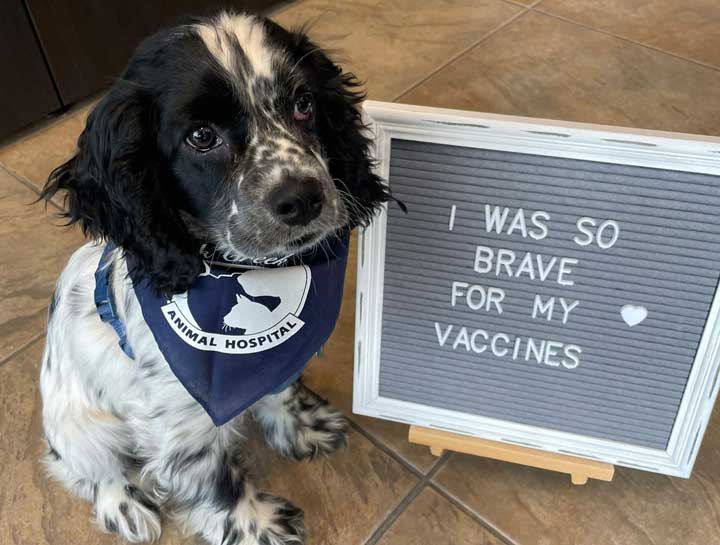Dog Vaccines
When we discuss vaccinations for your dog, we often need to consider your pet's lifestyle to make recommendations that will keep your pet protected.
We will discuss with you factors such as:
- Exposure to other dogs
- Access to wildlife and their environment
- Local and international travel
- Exposure to ticks
We understand that our clients need to weigh the risks and benefits when choosing vaccinations. Potential concerns following vaccination include a slight fever, lethargy, anorexia, soreness at the injection site, and, very rarely, an allergic vaccine reaction. Adjuvants, contained in many vaccines are used to enhance the body’s immune response but can, unfortunately, cause some of these negative side effects.
Our vaccines are free of adjuvants and are a smaller volume, which most pets appreciate. Let’s look at the infectious diseases we recommend all our patients are protected against in their core vaccines, Distemper Virus, Parvovirus, Parainfluenza virus, Adenovirus (DA2PP), and Rabies:
Canine Distemper Virus: a virus that affects the respiratory tract, gastrointestinal tract, and central nervous system. It is transmitted by oral, nasal, and ocular secretions. Young dogs are most often affected but unvaccinated dogs of any age are at risk. Signs include fever, coughing, vomiting/diarrhea, and seizures. This infection is often fatal.
Canine Parvovirus: a virus that is highly contagious and affects the gastrointestinal tract and bone marrow. It is transmitted by fecal-oral transmission and sustains very well in the environment, resulting in infection of entire litters. Signs include fever, vomiting, diarrhea, and anorexia. There is a fairly high fatality rate in young puppies that contact with this virus and survival is often associated with intense care for days to weeks in the hospital.
Canine Parainfluenza Virus: a virus that is highly contagious and affects the upper respiratory tract. Affected dogs typically experience coughing, nasal discharge, fever, and lethargy. Infection can progress to pneumonia.
Canine Adenovirus: a virus that affects the respiratory tract, gastrointestinal tract, and liver. Signs of this infection include dry cough, retching/gagging, fever, lethargy, and nasal discharge. This virus is typically transmitted in urine, ocular, and nasal secretions from infected animals. In severe cases, more common in puppies, this infection can be fatal.
Rabies Virus: a virus that is transmitted by a bite from an infected animal such as raccoons, skunks, foxes, and bats. It affects the brain and central nervous system. Signs include fever, seizures, paralysis, change in behaviour, coordination, and salivation. If an unvaccinated animal is exposed to a potentially rabid animal, they must be quarantined to watch for symptoms. There is no test for rabies. Rabies vaccination for our pets is required by law for good reason. Although rabies is rare, it is zoonotic (can be transmitted to people). Infection is always fatal in unvaccinated animals and may be fatal in humans.
Optional (non-core) vaccinations are also available for dogs, depending on lifestyle risks. These include Bordetella, Leptospirosis, and Lyme:
Bordetella Bronchiseptica: a bacteria transmitted in respiratory secretions of infected dogs and through fomites (surfaces) where infected dogs have been. This bacteria will typically cause a dry hacking cough but can progress to life-threatening pneumonia in some cases. This vaccination is typically recommended for dogs that will be exposed to unknown dogs or frequenting facilities with high dog traffic such as dog parks, boarding facilities, grooming facilities, and puppy classes.
Leptospirosis: a bacteria transmitted in the urine of infected wildlife/dogs, targeting the kidneys and liver. Initially, this infection will cause fever, lethargy, decreased appetite, and possibly increased drinking and urination. For pets that are treated aggressively and recover, many will have permanent organ damage. This vaccination is recommended for dogs that have any risk of exposure to wildlife and their environment.
Lyme disease: caused by the bacteria Borrelia burgdorferi, transmitted by deer tick bites. Although dogs can be protected with oral or topical tick-preventative products, this vaccine is recommended for pets that have a high risk of exposure to ticks (camping, cottaging, living in tick endemic regions). Lyme disease can result in damage to the kidneys and the joints of affected dogs.
The vaccine appointment has another invaluable aspect that we can’t over-emphasize - the physical check-up. We want to help keep your pet healthy and happy for as long as possible. Our doctors ask very specific questions and complete a thorough physical exam to detect issues that an owner may not be aware of. For example, subtle changes in mobility and range of motion can indicate early arthritic change. Behavioral changes, such as sleeping more and being less playful, may be mistaken by owners as normal aging changes when, in fact, their pet is experiencing pain. Regardless of the choice surrounding vaccines, a regular check-up is vital to the health of your dog.

